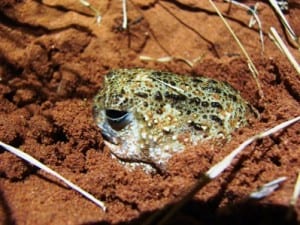
Could knowledge of this water-holding burrowing frog save your life in the desert?
It is a well known fact – based on on numerous scientifically accurate feature films – that in the event of the end of the world some people will survive the initial devastation only to find themselves barely surviving in some post-apocalyptic hell. Here I’m exploring whether zoologists would fare better than the average survivor. If the answer is yes, perhaps university biology admissions tutors can add a slide to their recruitment presentations to highlight this additional benefit in what is already the best subject in the world.
I spent this weekend on a survivalist course deep in the Dorset wilderness for an old friend’s stag do. As kids, along with his two brothers, we had spent our time building shelters in the woods, making fires, distilling mud, firing bows and arrows and generally acting as if the world had already been taken over by luminous slime mould from the future. As teens and students (and occasionally still) we spent our holidays walking in the mountains and not really engaging much with humanity. Wildlife and wild-living have stuck with us all: the stag is now an ecologist, I run a zoology museum (and spend a couple of months a year living in a tent in outback Australia) and his brothers are biology and geography teachers. As a result we are all pretty cocky when it comes to hanging around in woodland areas. This weekend’s course made us all question our ability to actually survive.
Should a virus/aliens/a powerful strain of concrete decay/zombies/frozen dinosaurs/Simon Cowell/nuclear war cause us to abandon human dwellings, shelter, water and food are the priorities. Would my academic and professional experiences as a zoologist make me Dennis Quaid? (more…)
 Close
Close




